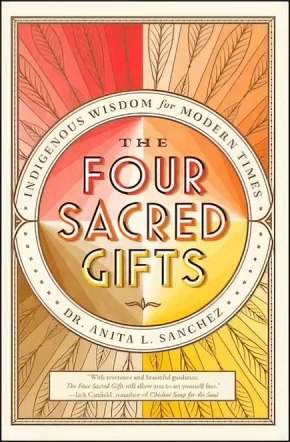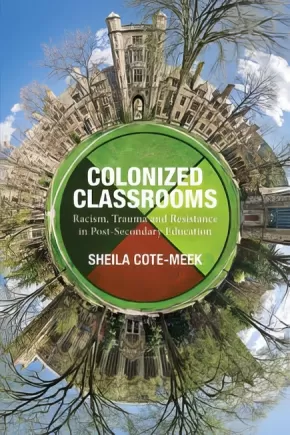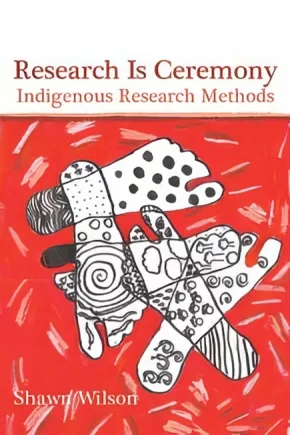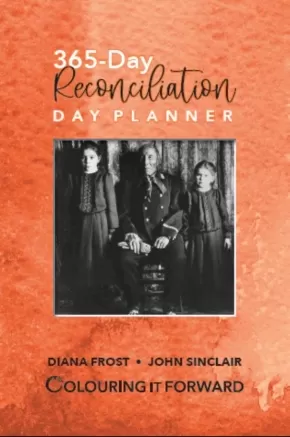
Professional Development
46
-
50
of
50 Results;
Sort By
Go To
of 4
The Four Sacred Gifts: Indigenous Wisdom for Modern Times
$24.99
Format:
Paperback
Text Content Territories:
Indigenous Central American; Indigenous Peoples in Mexico; Nahuas;
Reading Level: N/A
ISBN / Barcode: 9781501150869
Synopsis:
Synopsis:
In The Four Sacred Gifts, visionary international business consultant Anita Sanchez, PhD, reveals the timely prophecy entrusted to her by a global collective of indigenous elders—four guiding gifts that “will allow you to set yourself free to live your most successful life…learn how to forgive, to heal, to unite with all life, and to revitalize hope” (Jack Canfield, co-author of Chicken Soup for the Soul).
As we ride the powerful waves of change occurring in our economic, social, political, and physical environment, indigenous wisdom is needed—now more than ever—to guide us to inhabit the fullest and healthiest lives possible.
The Four Sacred Gifts opens your mind and heart to an indigenous worldview that will ultimately free you from fear and empower you to find peace even in the conflicts of our tumultuous world. Based on a prophecy that is now coming true, this book reveals how our world depends on each of us discovering a interconnectedness to people, earth, and animals, in the awareness that we are “all one relation.”
Within these pages, you will find deep wisdom of elders from all continents as they come together to give you four sacred gifts: the power to forgive the unforgivable, the power of unity, the power of healing, and the power of hope. These gifts will guide you to transformation, and support your journey to wholeness.
By following the powerful principles, lessons, and tools found in this book, you will experience personal breakthroughs, become a force for conscious, societal evolution, and learn to live in deeper harmony with all of humanity.
Reviews
"No remedy is more needed in today’s confusing and seemingly chaotic times than the power of simple wisdom. In this beautifully written book, Anita Sanchez draws on her own moving and revealing life experiences to present four gifts of indigenous wisdom that can help us heal ourselves, our communities and our broken world.” — William Ury, co-author of Getting to Yes and author of Getting to Yes with Yourself
"The Four Sacred Gifts is a beautiful answer to why so many people feel separate, alone, and afraid, and how to get back naturally and easily into harmony, connection and love with ourselves, nature and each other. I highly recommend reading and processing all the wisdom of The Four Sacred Gifts." — Christy Whitman, New York Times bestselling author
"In her exquisite book, Anita Sanchez makes an offering to us of the Four Sacred gifts that were given to her by her Elders. Though her own insights and personal stories, she brings to life the power and critical relevance of indigenous wisdom to our times. If you care about the state of the planet, if you are moved by injustice and the all the ways we humans cause suffering to ourselves and others,The Four Sacred Gifts offers the message and good medicine we need to lead a life in balance and help leave a better world for the coming generations." — Robert Gass, co-founder the Rockwood Leadership Institute
Additional Information
224 pages | 5.50" x 8.37" | Paperback
Colonized Classrooms
$27.00
Format:
Paperback
Text Content Territories:
Indigenous Canadian;
Grade Levels: University/College;
ISBN / Barcode: 9781552666531
Synopsis:
Synopsis:
COLONIZED CLASSROOMS
Racism, Trauma and Resistance in Post-Secondary Education
In Colonized Classrooms, Sheila Cote-Meek discusses how Aboriginal students confront narratives of colonial violence in the post secondary classroom, while they are, at the same time, living and experiencing colonial violence on a daily basis. Basing her analysis on interviews with Aboriginal students, teachers and Elders, Cote-Meek deftly illustrates how colonization and its violence are not a distant experience, but one that is being negotiated every day in universities and colleges across Canada.
Educator Information
Contents: Setting the Context • Conceptualizing the Impact of the Colonial Encounter • Negotiating the Culture/Colonial Divide in the Postsecondary Classroom • Negotiating Race in the Postsecondary Classroom • Trauma in the Classroom • Resisting Ongoing Racism and Colonialism in the Postsecondary Classroom • Closing the Circle: The Possibilities for Transformational Pedagogy • References
Additional Information
198 pages | 6.00" x 9.00" | Paperback
Cree Ways of Knowing and School Science
$23.00
Format:
Paperback
Text Content Territories:
Indigenous Canadian; First Nations; Cree (Nehiyawak); Woodland Cree; Rocky Cree; Barren Lands First Nation;
Reading Level: N/A
ISBN / Barcode: 9780981151892
Synopsis:
Synopsis:
Drawing upon a variety of academic sources as well as personal and professional experiences, Dr. Michell, a member of the Barren Lands First Nation, offers a book designed to assist educators in coming to understand the larger frameworks of Cree ontology (ways of seeing the world and one’s place in it), epistemology (ways of understanding knowledge), and methodologies (ways of teaching).
While Dr. Michell’s book is a specific example of Cree culture, from northern Saskatchewan, the message is most certainly transferable beyond the Barren Lands First Nation example, and as such, offers readers entry into thinking about how to make bridges between diverse ways of knowing that is applicable cross-culturally.
Reviews
"The book Cree Ways of Knowing and School Science provides a good personal description of Cree culture and how it can improve science teaching in the classroom for First Nations students. Drawing from his experience in Northern Saskatchewan, Dr. Michell illustrates the importance of hands-on experience for students and the need to relate what they are learning in the classroom to their culture. Most importantly, Dr. Michell promotes taking the students to the knowledge holders (the Elders) and to the natural teaching lab (the land), thus incorporating traditional knowledge in the teaching of science. Elders are an essential component in this endeavour. This book will be of interest to current and prospective teachers as well as to anyone interested in cross-cultural experiences and learning. This book provides a timely contribution to the question of how to improve educational outcomes for First Nations students, a critical issue for federal, provincial and First Nations governments." - Fidji Gendron, PhD
Educator Information
Table of Contents
Preface
1. Introduction
2. Nîhîthawâk Ithînîwak
3. Nîhîthawâk Ithînîwak and School Science: A Storied Reflection
4. Nîhîthâwatîsîwîn
5. The Concept of Indigenous Science
6. The Concept of Western Science
7. Assumptions in Western and Cree Ways of Knowing
8. Promising Practices: School Science in Cree Contexts
References
About the Author
Additional Information
88 pages | 7.00" x 10.50" | Paperback
Research Is Ceremony
$28.00
Format:
Paperback
Text Content Territories:
Indigenous Australian; Indigenous Canadian;
ISBN / Barcode: 9781552662816
Synopsis:
Synopsis:
Indigenous researchers are knowledge seekers who work to progress Indigenous ways of being, knowing and doing in a modern and constantly evolving context. This book describes a research paradigm shared by Indigenous scholars in Canada and Australia, and demonstrates how this paradigm can be put into practice. Relationships don’t just shape Indigenous reality, they are our reality. Indigenous researchers develop relationships with ideas in order to achieve enlightenment in the ceremony that is Indigenous research. Indigenous research is the ceremony of maintaining accountability to these relationships. For researchers to be accountable to all our relations, we must make careful choices in our selection of topics, methods of data collection, forms of analysis and finally in the way we present information. I’m an Opaskwayak Cree from northern Manitoba currently living in the Northern Rivers area of New South Wales, Australia. I’m also a father of three boys, a researcher, son, uncle, teacher, world traveller, knowledge keeper and knowledge seeker. As an educated Indian, I’ve spent much of my life straddling the Indigenous and academic worlds. Most of my time these days is spent teaching other Indigenous knowledge seekers (and my kids) how to accomplish this balancing act while still keeping both feet on the ground.
Reconciliation Day Planner (7 in Stock)
$42.00
Artists:
Format:
Paperback
Text Content Territories:
Indigenous Canadian;
ISBN / Barcode: 21-DF-046-1
Synopsis:
Synopsis:
Colouring It Forward is honoured to have collaborated with Cree Elder John Sinclair in the design of this day planner that is dedicated to fostering Truth and Reconciliation. They are also grateful to Ashley Barclay for her artwork, to Crystal Fraser and Sara Komarnisky for allowing us to share some of their recommended Acts of Reconciliation.
Would you like to learn more about Indigenous issues, and culture to participate more fully in reconciliation?
This day planner offers you:
- Answers to questions about culture, issues and spirituality by Cree elder John Sinclair
- suggested ReconciliActions
- important Indigenous dates to observe
- update on the TRC's 94 Calls to Action: where the government is at with implementing the Calls to Action
- 3 colouring images by Metis artist Ashley Barclay
- 365 undated pages to record your meetings, your daily gratitude and your reconciliation plans!
- Each day planner sold will provide a donation to Piitoayis Family School
Sort By
Go To
of 4











